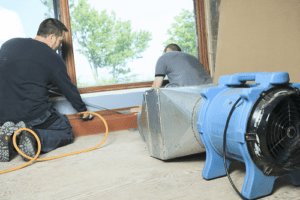When it comes to HVAC maintenance and upkeep, heating duct cleaning is one of the steps that tends to go overlooked. Most homeowners and business owners know that it is important to have their furnaces and air conditioning units inspected and serviced regularly. By keeping up with an annual HVAC maintenance schedule, you will hopefully be able to prevent any potential breakdowns or major performance issues in the future. Perhaps because ductwork tends to be “out of sight and out of mind,” though, many people do not realize how vital duct cleaning can be.
How Ducts Become Dirty
 Before we delve fully into why heating duct cleaning needs to be on your agenda, let’s talk about the purpose ductwork serves. For standard heating and cooling methods, airflow is essential. Your ductwork is a pathway for this airflow to occur. It pulls in air from throughout the house or building and delivers it into your furnace or air conditioner. The unit then heats or cools the air and then pushes it back into the ducts so that it can be delivered throughout the space.
Before we delve fully into why heating duct cleaning needs to be on your agenda, let’s talk about the purpose ductwork serves. For standard heating and cooling methods, airflow is essential. Your ductwork is a pathway for this airflow to occur. It pulls in air from throughout the house or building and delivers it into your furnace or air conditioner. The unit then heats or cools the air and then pushes it back into the ducts so that it can be delivered throughout the space.
Unfortunately, when the heating or cooling unit starts pulling in air, it’s not just pulling in air. On the contrary, over time, your ducts are also going to pull in a bunch of pollutants: dirt and dust; pet hair and dander; cigarette smoke; cleaning products; microscopic bacterial microbes. Ideally, your furnace filter will catch most of this junk—at least the bigger pieces of debris—before it makes its way into your furnace unit. This filtration process at least protects the furnace from debris that might damage its internal components. However, it doesn’t prevent debris from building up in your ducts.
Just how much debris is in your heating ducts right now? The answer depends on how much time as passed since your last duct cleaning. In some severe cases, duct cleaning experts have pulled literally pounds of dust and debris out of ducts.
Why Heating Duct Cleaning Is Important
As you might expect, having pounds of unwanted debris in your ducts is a problem. Here are just a few of the issues you might face if you have dirty ducts:
- Airflow problems. We don’t think of dust taking up a lot of space, but over time, debris can build up in your ducts (and on your vents) to the point that it impedes regular airflow. Have you ever looked at a heating vent and been surprised at how dusty or dirty is? If you pay attention to these vents when the heat switches on, you will be able to feel how all that built-up junk slows or stops your airflow. That problem is happening not just on your vents, but throughout your entire ductwork system. The airflow problems can impact how much hot (or cold) air is making it to your vents, which can, in turn, affect temperature and overall comfort. Your heating or cooling unit will then need to work that much harder to achieve the set thermostat temperature, which will mean more energy usage, higher utility bills, and quicker wear and tear on the unit itself.

- Unpleasant odors. Air tends to take on the character of whatever it flows through. In heating and cooling, this factor drives the entire process, as the air flows over/through a hot or cold medium and is heated or cooled itself. Unfortunately, when your ducts are dirty, the air will also pick up some of the character of the debris—usually in terms of odor. The air coming out of your ducts could carry a distinctly stale scent, or even a moldy odor if mold spores or mildew have started to build up in your ducts. Having your ducts cleaned regularly can keep your home or building smelling fresh.
- Air quality concerns. While musty or stale odors are unpleasant, it’s important to remember that the big problem isn’t the odor itself, but what the odor indicates. Bad-smelling air typically signals a problem with air quality itself. You don’t want to be smelling that air, but you also probably don’t want to be breathing in whatever it’s carrying along with it, which may include bacteria or allergens such as pet dander, pollen, or mold. These allergens can cause a range of different health concerns, whether by aggravating asthma conditions or triggering coughing, sneezing, or other upper respiratory problems. These issues are especially problematic for young kids or seniors, but they can drastically impact health and quality of life for individuals of any age. Thorough duct cleaning, therefore, is most important as a means of creating a healthier interior environment within your home or business.
When to Schedule Air Duct Cleaning
If you have noticed any of the issues above, you should call an HVAC contractor to carry out heating duct cleaning as soon as possible. Even if your air vents haven’t reached the point where they are visibly dusty or dirty, though, it’s still wise to keep a duct cleaning routine. Most experts recommend having your ducts cleaned every 3-5 years to maintain airflow and air quality. You can also help prevent dirty ducts by cleaning your vents regularly, by vacuuming and dusting to clean up debris before it makes its way to your ducts, and by replacing your furnace filter on a regular basis.
